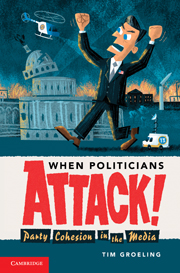3 - Breaking the “Eleventh Commandment”
Party Cohesion in Presidential News
Published online by Cambridge University Press: 05 June 2012
Summary
Since the liberals in the Washington press corps will always play up a Republican who fights other Republicans, there is a certain advantage in breaking with the team.
– Newt GingrichINTRODUCTION
In what became known as his “eleventh commandment,” Ronald Reagan famously warned his fellow Republicans, “Thou shall not speak ill of a fellow Republican.” Unfortunately for politicians seeking such reticence from their fellow partisans, based on the predictions of the model presented in Chapter 2, I conclude that journalistic standards of newsworthiness hobble the presidential party's attempts to do anything but speak ill of the president in the news.
Conservative radio commentator Rush Limbaugh bitterly complained about the news media's role in such violations of Reagan's commandment, saying, “You go against your own party…they'll love you in Washington. They'll love you at The New York Times and Washington Post if you talk that way” (Limbaugh 2005). Although Limbaugh, Newt Gingrich, and others seem to attribute such outcomes to liberal malfeasance, Chapter 2 makes it clear that a model that explicitly assumes that journalists balance their coverage of the two parties can account for them. Moreover, as this chapter shows empirically by examining stories from the unified Democratic governments under Carter and Clinton, the media's coverage of disputes within a party is certainly not only a Republican problem.
In this chapter, I empirically test the predictions and propositions advanced in Chapter 2, primarily through analyses of network evening news content spanning the past 25 years.
- Type
- Chapter
- Information
- When Politicians AttackParty Cohesion in the Media, pp. 71 - 96Publisher: Cambridge University PressPrint publication year: 2010



